When my eldest daughter told me she was experiencing bad anxiety, I listened to her. I hugged her and I told her I was there for her. And I wasn’t surprised. I knew something was up. Even though I didn’t know it, that conversation was the turning point of our relationship.
Without either one of us realising it at the time, this conversation marked the change between a parent/child relationship and a parent/adolescent relationship. No longer did I tell her what I wanted to hear. Instead, I listened to her and validated her feelings. I accepted what she was telling me, I acknowledged her pain and I asked her how I could help her best. What did she need from me?
I didn’t know the answer to that question. She didn’t know the answer to that question. But that didn’t matter. What mattered was that we figured it out, together.
Fast-forwarding a few years, and she says to me, “I think I have ADHD.” My immediate reaction was, “No. You don’t have ADHD.” And I dismissed the suggestion. My main argument was that as a child she had often spent hours in independent, extremely focused activity. She laughed and pointed out that was one of the symptoms. And she went ahead and made herself an appointment with a psychiatrist to get an assessment.
I’m so pleased she did. Because she is right. Her diagnosis of ADHD wasn’t just a borderline diagnosis, it was an extreme diagnosis. As with her anxiety, she didn’t just go for merit, it was excellence she was after.
The psychiatrist pointed out that ADHD was often misdiagnosed in teenage girls as anxiety. And it made me realise just how hard she has been working in the world to show up as a 100% functioning human when she has a high level of disorganisation and fogginess inside her brain.
I’m extremely pleased she listened to herself and got this appointment. I’m pleased she got a diagnosis. I’m pleased she’s sharing her learning with me. And I’m really pleased she’s getting the help she needs to get better.
Her psychiatrist was fantastic. His two important key messages which we weren’t given when she was diagnosed with anxiety were:
- It’s not you, it’s the condition
- You will totally recover from this
Such important messages to be given to a patient from a person in authority. He saw her as a person and delivered these messages because he could see she needed them.
We left the diagnostic interview that day with a temporary prescription as the medication will be adjusted as required AND a brain-balancing exercise to do every day. He’ll be following up with her and working together with us to make sure she gets the support she needs as we learn more about how her brain works.
Here are the signs I missed while she was growing up, that stood out at the interview. Things I’d never thought to question:
- Finding it hard to get to sleep
- Regularly not staying asleep
- Being loud and having no perception of an inside voice
- Easily distracted
- Always keen to try something new
- Had a lot of things she was juggling and always being very busy
- Difficulty choosing
- Constantly losing stuff
- Meticulous attention to detail
Often I parented her in a way that enabled her to mask her ADHD. With a busy family life (she has twin siblings just two years younger), the routines I had in place kept a lot of her ADHD in check. It also meant it wasn’t something I taught her to manage.
I’m so proud of my girl. She’s amazing. She’s unique. And I wouldn’t change that one bit. Watching her grow and work so hard, I’m also relieved she will be able to harness her incredible energy and talent in her twenties.
I’m also constantly amazed at just how much more we now know about brains. How they work, and the implications for us as we learn more every day. A key takeaway: just ask, a professional brings so much more knowledge to a scenario that we’d never expect to know otherwise. Having a diagnosis gives you a starting point and their knowledge continues to be of service as you plan a way forward. ADHD is just a brain that works differently, it doesn’t equate to an entire person. And ADHD can be worked with, allowing the person to show up more authentically in the world.
As for me, I apologised to her for not listening when she needed me to, and I thanked her for continuing to listen to herself and pushing for her needs to be met. That’s my girl ❤️
